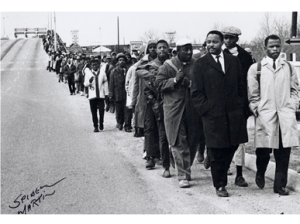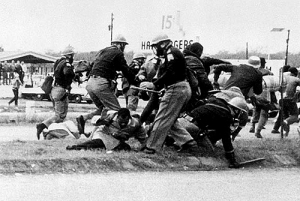Texts: Genesis 1:1-5 + Psalm 29 + Acts 19:1-7 + Mark 1:4-11

There’s a scene in the movie Selma, which opened this weekend, in which the Reverend Hosea Williams and a young John Lewis are leading a crowd of hundreds in crossing the Edmund Pettus bridge on what came to be known as “Bloody Sunday,” March 7, 1965. As the two civil rights leaders look ahead to the far side of the bridge they can see state troopers led by County Sheriff Jim Clark along with a mob of angry white people. Looking down at the Alabama River below them, Hosea Williams asks, “Do you know how to swim?” To which John Lewis replies, “There aren’t many swimming pools that allow blacks in my neighborhood.” The meaning behind their exchange is clear: the act of crossing these waters will put their lives in danger.
That’s what Christian baptism is, a passing through waters that puts your life in danger.
When the John the Baptist called the people out of the city walls, into the wilderness offering a baptism of repentance for the forgiveness of sins (Mark 1:4), he wasn’t offering a wilderness retreat. It wasn’t a countryside getaway. It wasn’t a day trip with meals included. John led people out into the wilderness calling on them to repent and be forgiven. It was an invitation to leave the broken status quo behind.
Forgiveness was the business of the Temple, it was a part of the religious establishment’s franchise. It was a well-known and understood exchange of goods in return for priestly services. It was an allowed activity, a local concession made by Rome for people living under occupation. A lot of religion is like that, a perfectly acceptable bit of inoffensive ritual that threatens no one and changes nothing. What happened on the Edmund Pettus bridge was not an inoffensive bit of ritual. It threatened the power of Jim Crow laws that had bolstered a system of racial segregation that had kept Black people oppressed, stripped of their civil rights and denied any means of recourse and it changed the course of the nation.
 On the day of that first march across the Edmund Pettus bridge, no one thought a few hundred Black people marching out under the Alabama sun could change much of anything. It was just street theater, and it could be dealt with. But when the nation turned on their televisions in 1965 and saw law enforcement charging on horseback into a crowd of non-violent protestors, beating Black men and women, young and old, with fists and clubs, the power of that bit of ritual, that street theater, became clear.
On the day of that first march across the Edmund Pettus bridge, no one thought a few hundred Black people marching out under the Alabama sun could change much of anything. It was just street theater, and it could be dealt with. But when the nation turned on their televisions in 1965 and saw law enforcement charging on horseback into a crowd of non-violent protestors, beating Black men and women, young and old, with fists and clubs, the power of that bit of ritual, that street theater, became clear.
I know that for many people, Holy Baptism is a polite rite. An occasion for photographs and brunch. And I love those things, photographs and brunch, I love them a lot. But when I smile for the camera or share in the joyful repast after a child is baptized, what I am celebrating is another life dedicated to the God who is revealed in Jesus of Nazareth, who baptizes us with the Holy Spirit, which is the power of God unleashed upon the world for its liberation, reconciliation and restoration.
After Jesus had engaged the rulers of this world and defeated all the powers of death the Holy Spirit called women and men to continue that work, people like the apostle Paul, initially slow to recognize the Spirit’s movement for what it was, but zealous for the Lord after his conversion. As he traveled through Greece, Paul came upon a group of twelve disciples, like those first twelves disciples Jesus had called away from all they’d known to follow him. When he learned that they too were followers of Jesus, he asked them if they had received the Holy Spirit when they came to believe in Jesus. Their answer is heartbreaking. They said, “No, we have not even heard that there is a Holy Spirit.”
These twelve Greek disciples knew the name of Jesus, even called themselves his followers, were even baptized into John’s baptism, which is to say that they had experienced a renewal of their consciousness, had experienced a kind of epiphany, had come to know that the world as it is is not the world as God intends it to be, had accepted a call to leave the status quo behind. But it stopped there. They had begun their turning toward God, but they had not experienced the power that comes with baptism into God’s mission, the power that goes beyond withdrawing from this world to participating in its recreation. When Paul heard this he baptized them at once in the name of the Lord Jesus, and they began to speak in tongues and prophesy.
When I was a boy, I asked my dad about speaking in tongues and he told me that some Christians experience the Holy Spirit in ways that fill them with inspired divine speech which, when paired with someone who had been given the gift of interpretation, could result in a kind of divine testimony in the assembly. For many years that was the only image I had for speaking in tongues. Later in my life when I was called on, time and time again, to speak before teachers and bishops and to offer my own testimony about the movement of the Holy Spirit in my life calling me, anointing me, to bring good news to the poor, and freedom to those held captive by the closet, and liberation from the short-sightedness of institutional preservation at the expense of human dignity, I did not realize that I, too, was speaking in tongues. In those moments I did not have notes in my hands and I did not know what I would say, but as they were needed, words would flow from my mouth, the right words at the right time. And sometimes, when the Holy Spirit was moving in the hearts and minds of those to whom I was speaking, they could actually hear me, and a new understanding emerged. There was liberation, and reconciliation, and healing.
Now I know that I was speaking in tongues, which is to say that I was speaking the same English words in the same English sentences, but filled with the presence of the Holy Spirit which blows where and when it will. I remember on one occasion, after I’d finished giving my testimony, a man asked me, “so, do you imagine yourself as some kind of prophet?” and being the good, Midwestern Lutheran I was raised to be I said, “no, not at all. I’m just trying to be honest and stay true to the God who put me on this path.” As though that isn’t precisely what it means to speak in tongues and prophesy. To tell the truth in the face of a lie so pervasive it passes for reality.
It happens at least a hundred times a day. You see something, or you hear something, or you read something that you know is simply untrue. This last week it might have been something about Muslims in the wake of the tragic terrorist attacks on the French publication Charlie Hebdo and the hostage crises that followed. Maybe you read or overheard the violence of these attacks being blamed on Islam.
Or perhaps it was a news story reporting on the culture of sexual violence against women that exists on every campus in this country, but gets dismissed as an internal affair. Perhaps you heard excuses being made for the misbehavior of young men as if date rape was inevitable.
Or maybe it was a comment shared by coworkers, or on social media, about how we should’ve expected the work slowdown by New York police after the riots following the death of Eric Garner and the murders of two NYPD officers, Rafael Ramos and Wenjian Liu, as if to imply that we as a nation are not capable of both supporting our police officers and also holding them accountable for their conduct.
Finding the words to speak and the courage to say them in the face of a culture of silence and stasis is the work of the Holy Spirit, which blew over the chaotic waters at creation and brought something out of nothing. Finding the strength to not only withdraw from a world that breaks your heart, but to join together with others who share your pain, your grief, your experience and organize to change it is the work of the Holy Spirit, which enters at baptism and makes us members of one body, so much larger than any one of us could ever be on our own.
And the point isn’t that the Holy Spirit only acts through those who’ve been baptized, or won’t act until you’ve been baptized, or waits for you to decide to be baptized. The point is, the God who meets us in the waters of baptism is always at work in this beat up world of ours, but so often it’s hard to see. However, each time one of us comes to the water, we are making clear what the world tries so hard to conceal, which is the truth. That all are welcome and there is always enough. Each time one of us brings our precious child forward to these waters we are not only saying no to the death-dealing forces that are always reducing us to something anonymous, a number, a dollar, a bottom line; we are placing what is most valuable to us in service of a world that we still haven’t seen, that’s still being created, that is coming toward us from the future, that threatens to change everything. We are joining the movement.
Amen.